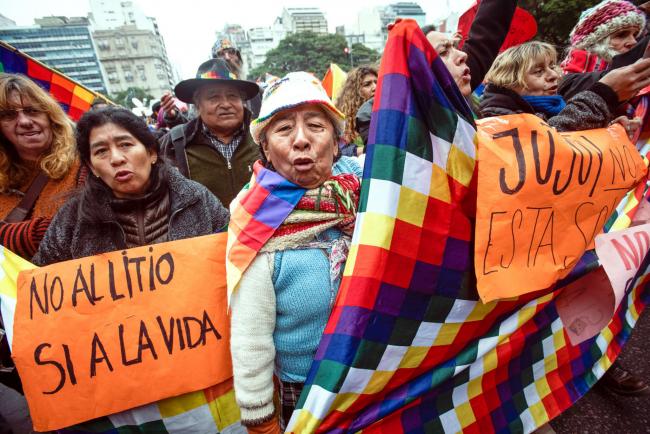Articles Menu

July 2, 2023
For weeks now, the people of Jujuy, Argentina, have been in the streets resisting right-wing political attacks on wages and the right to protest. In the past few days the conflict has escalated with severe police repression throughout the largely Indigenous and impoverished province.
Reports from on the ground show repression including massive deployments of riot police, people being chased in the streets and home invasions. However, there are also many videos of resistance, including huge marches, Native women working together to expel plainclothes police officers from their protests, and displays of solidarity from sugar workers and miners.
Much of the on-the-ground reporting from Jujuy has come from the La Izquierda Diario Network, a network of socialist websites I contribute to that includes Left Voice and La Izquierda Diario. The network is affiliated with the Party of Socialist Workers, which has recently been a growing influence in the province’s political landscape.
In question is a partial reform to the provincial constitution which opens more land in Jujuy to resource extraction while criminalizing various forms of protest. Jujuy is part of the “lithium triangle,” a region which holds more than 50 percent of the world’s lithium reserves. In the context of a global competition for lithium, Jujuy and other parts of the region are strategic targets for multinationals. This sets the stage for greater conflict between the communities who live and work in the region and capitalists seeking to expand relationships with foreign capital.
The right-wing governor of Jujuy, Gerardo Morales — whose party Radical Civic Union (UCR) holds the majority in the provincial legislature — quickly moved the reform along over the course of two weeks. In response, protests quickly mobilized outside the parliamentary compound and throughout the province.
Police have used rubber bullets and tear gas against the protesters. Mijael Lamas, a 17-year-old who lost an eye when police shot a rubber bullet at his head, has become a symbol of the repression. Health workers, journalists and even an elected official have been arrested. A video shows the police arresting Natalia Morales, a Jujuy legislator with the Party of Socialist Workers, by dragging her by the limbs along an asphalt road. She has since been released, but dozens of people with lower profiles remain detained or missing.
The legislature passed the reform with bipartisan support from the UCR and the center-left Justicialista Front on June 20. Representatives of the multiparty left opposition, the Left Unity Front, including Natalia Morales, have been denouncing the reform and joining the protests in the streets. As a result of the protests, Governor Morales suspended two articles of the reform, 36 and 50, which removed language from the provincial constitution codifying the rights of Indigenous people to practice their culture and stating that private property must not interfere with health, safety, freedom or human dignity, but the mobilizations have continued to demand a full repeal of the reform.
The movement is starting to gain support at the national level. On June 22, marches were held throughout the country in solidarity with the protests. Throughout the week, unions called strikes in solidarity. Some of the largest calls included the primary teachers union in Argentina, which called a national strike on June 21, and the Jujuy chapter of Confederación General del Trabajo, the largest trade union federation in Argentina, which held general strikes in Buenos Aires and Cordoba along with several other union federations.
Several human rights organizations and leading environmental activists have denounced the repression and amplified the struggle, including Amnesty International, Extinction Rebellion and Greta Thunberg.
Governor Morales, who is running for president in the upcoming 2023 election, is unlikely to back down without intense pressure. Whether or not he can successfully pass the reform in Jujuy will likely impact how much support he can get from sectors friendly to the extractionist policies he represents in Jujuy.
While the stakes are high for Morales, they are also high for workers and Indigenous people in Jujuy and throughout Argentina, who are suffering from a severe economic crisis. They are unlikely to put up with even lower wages and extraction by foreign capital. In this context, it’s no surprise that Jujuy has become the epicenter of struggle in Argentina, with no signs of resistance dying down any time soon.